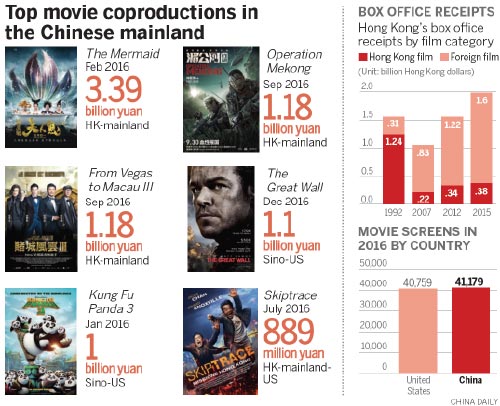 |
|
[Photo/China Daily] |
Cross-border benefits
Throughout the changes, Hong Kong filmmakers have turned to the mainland for finance. This collaboration has resulted in some "indie" movies, such as Pang's Love in a Puff series, becoming famous overseas. In return, the mainland has acquired the know-how of Hong Kong filmmaking talent.
Ann An, founder and chairman of Desen International Media, a renowned producer and distributor in the Chinese mainland, said the mainland's movie industry has always looked for creative talents from Hong Kong and overseas.
"The Chinese mainland movie industry has only been commercialized for 10 years. In terms of filming techniques, it still hasn't yet become full-blown, particularly when compared with Hollywood which has a history of more than 100 years," An added.
Coproduction offers a platform for movie makers to learn and exchange skills and ideas. And comedy is not Hong Kong's only strong suit.
The filmmaking techniques employed in the city's action movies are highly valued by mainland audiences.
Last year, action movies took four positions among seven Hong Kong-mainland coproductions in the top 20 blockbusters list.
Hong Kong director Dante Lam's Operation Mekong was the most prominent, pocketing 1.18 billion yuan.
Chen Tak-sum, a veteran Hong Kong action movie director, has embraced the dynamics of cross-border productions: "Action films are a relatively good fit when it comes to cross-cultural productions."
Chen's latest cross-border title Kung Fu Jungle, starring Donnie Yen and Wang Baoqiang, did well with global audiences, generating more than $100 million in worldwide box-office revenue, according to Box Office Mojo, which tracks box-office records.
This is especially true for the mainland. "The (martial) arts fights between characters, together with a reasonably straightforward storyline, can break the language and cultural barriers across the border," he said.